- Romance
- Swerve
Note: You can change font size, font face, and turn on dark mode by clicking the "A" icon tab in the Story Info Box.
You can temporarily switch back to a Classic Literotica® experience during our ongoing public Beta testing. Please consider leaving feedback on issues you experience or suggest improvements.
Click hereA NOTE from the Garden Team: A huge thank-you to Madeline Fletcher for her editing of this story. While the events of this story are fictional, the many stories which inspired it are true. For those who have a sensitivity to vehicle accidents, descriptions of pain, or who have experienced trauma in the past, PLEASE proceed with caution. If you enjoyed this story, please consider making a donation either to The Neighbourhood Clinic through our site, or to a hospital in your area. As always, we thank all of our readers -- be safe.
Tuesday, March 21st, 2011.
"God dammit, Michael. Just keep him in the office for five minutes. I'm literally two blocks away."
"Literally two blocks away, or as in you're stepping off your apartment step right now?"
"Two blocks. Five minutes. Just keep him in the waiting room, okay?"
"Okay," the young man's voice, slightly tinny on the other side of the telephone line, sounded resigned, "As fast as possible--okay?"
"Okay," I repeated, "Keep him there."
The telephone beeped as the call cut off from the other side. Cursing quietly, I slipped my phone into the pocket of my dress pants, picking up my pace slightly as I made my way across the white-striped crosswalk that connected French Street to 9th Street Northwest. I was on my way to Johnson-Lockman, an investment firm across the street from Benjamin Banneker High School. Tucking my hands into the pockets of a suit that I couldn't possibly have afforded without our business loan, I made my way around the corner passed R Street. Normally I could get a chuckle out of myself, looking at the street names of Washington, DC. Whoever had named them had been a genius, I thought--O Street, R Street, N Street. Pulling my phone out of my pocket once more, I clicked it on and checked the time below my waist. 12:18. Three minutes late to our 12:15pm meeting. Not a disaster yet, but something that could very quickly become one. Our business, a telecommunication startup that integrated GPS tracking with VPN safety-features, was relying on the investment-loan which we had been offered eleven days previously. Twenty-three million dollars. That was the estimated value of our company. From what had been two five-hundred dollar, second-hand laptops plugged into the electrical outlet in Michaels mother's living room. Forty-one thousand, today. Twenty-three million, maybe, by this time next year. Putting the phone back into my pocket, I stepped over the curb onto the red and white painted bike path.
It was an average day in Washington. The sky overhead was somewhere between grey and blue, managing to look overcast without being fully threatening. The air around me was almost damp, despite that it hadn't rained in three days and there's no rain expected for at least another two. A gentle breeze waved the leaves of the small trees which had been planted on each street corner. The buildings around me were all uniform; red-brown brick, two and three-story dwellings. Even the school was made of dusty brick, though the windows stretched slightly taller than the buildings around it, and the roof was flat rather than steepled. A bit of weak light reflected from the flat facets of the glass, catching my attention for a moment. Ducking around the front of a white BMW which had seen better days, I tucked the cellphone out of my pocket and clicked the screen-on button as I stepped onto R Street NW. I was a couple of feet off the cross-walk, which showed cracked white lines against the grey of the pavement. My eyes touched the screen of my phone--12:16pm.
It was a Ford E-Series Cutaway; the kind of white-walled box trucks that you usually see delivering packages for Amazon, or delivering the produce for lower-end restaurants. Of course, I didn't know that at the time. I only heard that later--days later. They hadn't done anything wrong. They were driving fifty-nine miles per hour in a fifty mile zone. They were going the right way down a one-way street. They'd signaled their turn. None of that made a single bit of difference.
At first, I didn't even realize I'd been hit. It wasn't that I didn't feel it; I definitely felt it. It was just how quickly it happened. They don't show you that part, in the movies. How fast everything happens. How fast everything goes. One moment I was looking down at the phone-screen peeking out of my dress-pant pocket, and the next I was rolling over the front hood of the vehicle. Well, not quite rolling. I felt the impact on my legs, the sharp crack as my hip met the reinforced driving plate. I'd always expected that a car would throw you backwards, but that's not how it happens, in real life; instead, I folded. I don't remember that part. If I really think about it, I might be able to remember my head and shoulder coming down over the curve of the front end, between the hood and the headlight. The screech of brakes. Maybe a scream; not from me, but from a woman on the other end of the sidewalk. The next thing I really knew, I was laying on the pavement.
Another part they don't tell you about in movies?--what you end up thinking about. My first thought, as I lay completely still on the uneven pavement of R Street NW with droplets of blood clinging to the inside of my open lips, was I'm going to be late for my meeting. I've never taken a first-aid class in my life, but I knew that I was broken. Not broken, like in a spiritual, psychoanalytic, force-of-will kind of way; broken in half, like a stick which had been cracked over a persons' knee. Not breath knocked out of me. Not give me a minute. Broken. Broken, irreperably.
I knew it because my fingers were dragging over the pavement below me, and my chest was shuddering as I struggled to breathe through the thick blood in the back of my throat, but the bottom half of my body was completely still. I wasn't trying to move it, but I knew I couldn't even if I had been. There were voices speaking from all around me. Shouting, high-strung voices. They didn't bother me; mostly because I couldn't hear what they were saying. Whatever pain I felt, it wasn't the way I had felt pain previously; it was an enormous, crushing, dark hand. A weight, holding me to the road, like an anvil had been set down on my chest. The voices didn't make any sense. There were just too many words, too many consonants, too many vowels, too many different sounds. It became a background hum as the world darkened. The road felt as if it were rotating, as if I were sliding downward toward a long, dark hole. I experienced a sickening sense of vertigo. My body was too heavy. I couldn't lift my chest to breathe. It was noon--so why was the sky becoming so dark? For a moment, I thought that it might be about to rain, despite the forecast.
I wanted to laugh, thinking of an admittedly derisive joke about weather forecasters. Then I realized, with a strange and sickening kind of clarity, that the sky hadn't changed hue at all. It was my vision which was failing. Part of me wanted to look down, to see what had happened to the bottom of my body. I knew I couldn't move an inch if I tried. The world darkened further. There was a man--at least, I think it was a man--leaning over me, talking rapid-fire with words which my brain still failed to comprehend. It wasn't even a buzz, any longer. I think maybe he had been trying to tell me something. I had an inkling that it was something important, but I just couldn't bring myself to understand the words. I kind of wanted to tell him my forecaster joke, but I couldn't speak. I didn't even have the energy to try. Closing my eyes, I let myself slip into the darkness. Strangely, the pain had somehow become more powerful, more urgent, yet more distant all at the same time. I choked one final breath, and then stopped trying altogether. Around me, sound faded. The world went black.
Acute fracture of the thoracic vertebrae, T11 and T12. Acture fracture of the lumbar vertebrae, L1 and L2. Minor fracture of the sacrum, six-inch break of the left pelvis. Two broken femurs. Complete shattering of the left patella. Two separate tears of the Iliopsoas, rectal femoris, sartorius and vastus lateralis. Tear of the ischiocavernosus. Full breakage of the external oblique, left-side gastrocnemius, left-side vastus medialis. Acute strain of the tibialis anterior, acute strain of both adductor muscles.
Basically, I'd been right. I hadn't taken the analogy far enough, though; I was like a stick which had been cracked over a knee, but which had not broken cleanly or completely. I was still connected--technically. A couple of fibers still held me together, but everything else below the waist had either splintered or fractured. Of course, I didn't know this at the time. It was all on the chart which hung on the end of my hospital bed. It had been recited to me in the compassionate but no-nonsense voice of the on-call medical advisor, after seventeen hours of intensive surgery and forty-eight hours of recovery. Not from the accident, but from the fog of sedation and the much heavier fog of disbelief.
I'm sorry Mr. Reyes, but you've lost the use of your legs.
"For how long?"
"Physical therapy can do wonders, but we must try to be realistic about our expectations." It hadn't been his words, which had given me the real answer--it had been the two seconds of silence which preceded them.
"Okay." I paused for a long moment, "Thanks."
Sunday, March 26th, 2011.
"Seventeen-five, man."
I lay under the sheets of the hospital bed. Despite heavy sedation, I could still feel a low pain radiating upward from the lower half of my body, and down from a point on the upper left corner of my forehead. My stitches weren't painful, but I could still feel them. They tugged at my skin, which they were holding closed, each time I adjusted myself on the bed. Something I tried to do the least amount possible. Each time I did, it only reminded me that I couldn't use my legs to do it. Despite that they were still attached to my body, they no longer belonged to me.
I could smell the complete sterility of the hospital; an almost stale smell that made me feel slightly light-headed. More light-headed, with the morphine that was currently being delivered to me 0.001mg at a time through the tube which disappeared beneath the bedsheets and into the taped-down needle inside of my arm, just below the elbow. Michael was standing at the foot of the bed, his hands folded on the plastic end-board. There wasn't any real reason I wasn't looking at him; except that I had decided to look out of the window. I could see the top of the College of Dentistry, through the heavy grey glass of the window. I was on the second floor of the Howard University Hospital. It's finally raining¸ I thought. It was true. Long lines of rain ran down the flat space of the glass; it reminded me that I hadn't cried--at least, not since the full-body sedation had worn off. Not once. My mother would have told me that meant I hadn't begun to mourn yet, but I knew that wasn't true, now. I had been mourning for two days. My mourning was an ocean, and I was clinging to a bit of wood trying not to be pulled down and out into the depths of it. I was experiencing it, though.
"Seventeen-five," Michael repeated, at the end of the bed, "I mean, it's not everything we wanted, but man... I know we can't celebrate. I don't really want to celebrate, but we should... we should do something."
"Go celebrate," I turn the back of my head against the slightly crinkly hospital pillow, staring over my chest at Michael, "Please. Get fucked up. Get fucked up, and then drink another beer for me. You've earned this."
"We earned this," Michael tightened his hands slightly, one over top of the other, against the end-board, "We did it, man."
I couldn't bring myself to answer that. I stared back at him silently and tried for a smile; by his own expression, I could see that I hadn't quite succeeded. Letting the attempt slip from my lips, I shrugged slightly.
"They won't let me drink in here," I lifted my arm from beneath the bedsheet, showing the other man the needle in my arm, "...Plus."
"Right," he pushed his lips to one side, "Well, you won't be in here forever. A couple of weeks, right? Then you can start doing therapy at home?"
I close my eyes for a moment. I know it's out of compassion that Michael is here, with me, in a stale-smelling hospital room at 11:46pm. It was out of a genuine sense of friendship that he was here, instead of our at a bar celebrating the fact that we had both become millionaires. I'll also admit, that didn't help. The idea of going back to my apartment made me feel almost sick. I pictured the three steps from my living-room to my kitchen, which were now almost as impassable to me as a wall. I pictured trying to fit a wheelchair into the empty box of the elevator, and something knotted in my stomach. I pictured lifting myself into my bed with only my arms; worse, I pictured not being able to do even that. I pictured the running-shoes at the bottom of my coat closet. Like I said--it's weird, the things that you think about during an emergency, or during grief. It's strange, the things that make you feel sick to your stomach.
"Buy me out."
This time, it was Michael's turn to stare at me. I could read the disbelief in his eyes clearly. His hands loosened on the end of the bed, and he looked like he might take a step backward; instead, he only straightened his back slightly and shook his head.
"No, man. No--that's not right. I couldnt... This was our project. We did this. You can still run things from an office, and--"
"I'm not going to be running things from an office," I closed my eyes and opened them in a gesture that was only a fraction longer than a blink, "Buy me out, Michael."
He shook his head for a moment, "Mateo, I know..." his voice trailed off, "Fuck. I can't imagine... but I know. I know this sucks. But they say with physical therapy... and surgery is getting better every day, and..."
"Buy me out."
I don't know whether it was the repetition of it, or the tone of my voice, or how my eyes held his steadily for the first time since he'd walked into the room. I don't know what convinced him. I don't really care. He lets out a long, slow breath. And then he nods.
"Okay, Mateo... Okay."
Monday, April 12th, 2011.
The space where a glass-faced table once sat in my living room is taken by by a pair of horizontal metal bars, bolted to the floor. This was all Michael's doing, I know; working with the hospital. The three steps have been replaced by a wooden ramp; it's a bare structure, but one he's assured me will be replaced by something more permanent by the end of the week. He's been here for the last week, organizing and reorganizing; taking things down from the top shelves that I can no longer reach, replacing my high-topped dresser with one that's wider and lower, moving the groceries in my fridge onto the bottom shelves, stacking my plateware on the counter, rather than the cupboards they'd been in previously. He's been something close to a superhero--and I hated him for it. I knew it wasn't fair, but I couldn't help it. Even the sight of him made me angry. The sound of his knuckles against the wood of my apartment door made me seethe. Which is probably why I snapped, when I heard them.
"Go away."
The knock came again.
"Fuck off!" I shouted, pulling back the left wheel of my hospital-provided wheelchair and facing the door from my living room, "Fuck off, Michael!"
"Wrong one." It was a woman's voice, who answered from the door.
I frowned, slightly taken aback. Then it clicked. I'd known it was my first day of physiotherapy, but the time had escaped me. Taking a deep breath, I exhaled through my nose and shook my head.
"Sorry--come in."
The door opened. It took me a moment, but when my eyes focused on the figure who came through the door, my heart stopped. I blinked. She was about my age; maybe a couple of years younger, or a couple of years older. The softness of her face made an age hard to place. Her hair fell around it, a straight sheet of brown down behind her shoulders. She wasn't dressed like a doctor. A pair of black yoga pants hugged her legs, and a white blouse fell open over a purple top. She smiled as she saw me, eyes squinting slightly as her cheeks pushed them upward.
"You must be Mateo," she closed the door behind her and walked across the space of my apartment. I'd never seen anybody fit a space so well. She reached out her hand, and I raised my own from the armrest of the wheelchair to clasp it, "I'm Rachel Mayeliks. Doctor Rachel Mayeliks."
"Doctor?" I ask, slightly surprised.
"Yes."
"Well--nice to meet you." I release her hand as the pressure eases, quite naturally. Her smile seems to light up the room.
"You as well. Now, tell me about what you've been doing. I see the support bars. That's good. Have you been using them? How's the chair?"
Monday, April 19th, 2011.
"I can't fucking do this!"
I'm ready to explode, clutching the armrest of my wheelchair as Rachel helps guide me back into it. It's not her fault--just like it's not Michael's fault, but I want to tear her hands away from my body. It's the feeling of helplessness. I'd thought that her being beautiful was a bonus. It wasn't. I'd never felt so helpless as I did when my arms gave out from the bars, sending me crawling back to the wheelchair at the end of them. Rachel helped, of course, when I would let her. Despite my anger, and my embarrassment, and the tears of helpless frustration that stung the corners of my eyes, it was rare that I let her help me. This time, I did. One of her hands tightened on my shoulder, as I reseated myself firmly on the chair.
"Mateo," her voice was gentle and reassuring, "you're doing incredible."
"Incredible," I nearly spat the word, "I can barely make it three feet."
"Yeah," her fingers squeezed my shoulder for a moment and then disappeared. Despite how much I hated needing her help to get back into my chair, the disappearance of those fingers left me feeling strangely empty, "Three feet--that's incredible."
"I used to be able to do fifty pull-ups. Now I can barely make it three feet on these--" I smack the back of my hand against the metal bar in front of me, and regret it instantly. It's bolted, and sends a flash of pain through the back of my hand, "stupid things."
"You're using different muscles," Rachel's voice spoke from behind me, easy and understanding. I could hear the sound of papers rustling, "This is going to take time. You have to be willing to give it that."
"What if I'm not?"
She appears in front of me, leaning down and folding her arms over my knees. It strikes me that it's a personal thing to do; not the kind of gesture that was usual between a physiotherapist and their client, but I don't say a word about it. Partly because I don't want to embarrass her, and partly because I don't want the arms to move. She stares up at me, her face serious, and blinks once.
"Then you're not. It's entirely your choice," she hesitates for a moment, and then reaches out and takes my hand. Her fingers squeeze over mine, exactly as they'd done around my shoulder a moment earlier, "but I believe in you. I know you can do it, with time. It's not going to happen immediately--" Is it my imagination, or do her brown eyes shine just a little bit brighter for a moment, "but all good things are worth waiting for, right?"
Taking a deep breath, I study her eyes and nod. My mouth opens, and then closes again. A second breath, and I nod more certainly.
"One more time," I move my eyes from her to the bars. The god-damn bars. A knot of determination forms in my stomach, "Give me... a hand?"








